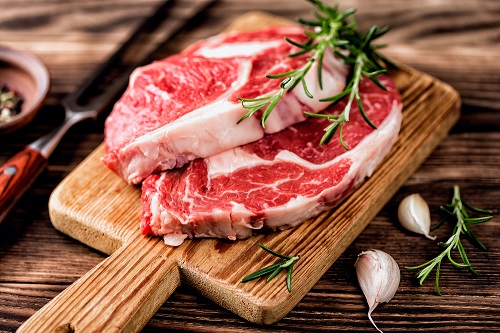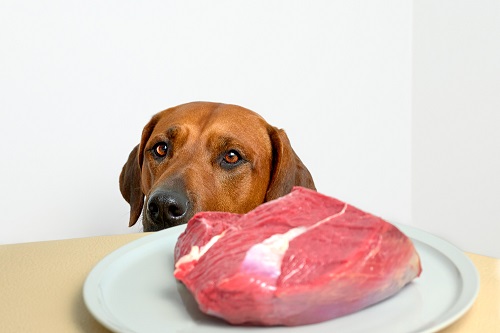Can I Feed My Dog Raw Meat from Supermarket? Learn the risks and benefits before making an informed choice for your dog’s diet.
Can I Feed My Dog Raw Meat from Supermarket? Weigh the pros and cons before taking the plunge. Discover the truth about raw diets for dogs!
What is Raw Meat?

Raw meat refers to uncooked meat that has not undergone any heat processing methods such as boiling, baking, frying, or grilling. It includes various types of animal flesh, such as beef, poultry, pork, lamb, fish, and more. Raw meat can be obtained from different sources, including butchers, supermarkets, or specialty stores.
You note that raw meat may contain pathogens, bacteria, or parasites that can pose health risks to both humans and animals if not handled, stored, or prepared properly.
Check put 10 High Fiber Dog Treats | Benefits and Precautions here
Can I Feed My Dog Raw Meat from Supermarket?
Before you feed your dog raw meat from the store, you need to think carefully about it. Raw meat has some good things for your dog, like protein, healthy fats, and natural enzymes. While there are also some risks as well—raw meat can have bad bacteria like Salmonella or E. coli that can make your dog sick.
You have to be really careful with handling and storing the meat to keep everyone safe. Also, raw meat might not have all the vitamins, minerals, and fiber that your dog needs to be healthy. It’s best to talk to a vet or a pet nutritionist to make sure your dog is getting the right nutrition.
Is Raw Meat from Supermarket Good for Dogs—A Few Health Benefits
Feeding raw meat to dogs from supermarkets, also known as a raw or “BARF” (Biologically Appropriate Raw Food) diet, is a topic of ongoing debate among veterinarians and pet owners. Some people believe that giving dogs raw meat is good for them, while others disagree. Supporters of raw meat say that it can help dogs claim their benefits such as:
- Improved Coat Condition: The high omega-3 fatty acid content in many raw types of meat can contribute to a shinier and healthier coat. Omega-3 fatty acids promote the production of sebum, a natural oil that conditions hair follicles and skin.
- Healthier Skin: Balanced diets rich in essential fatty acids, like those found in raw diets, can improve skin health by reducing inflammation and promoting cell repair and growth. This can help mitigate issues such as dryness, itching, and rashes.
- Higher Energy Levels: The high protein content in raw diets can provide dogs with steady energy. Proteins break down into amino acids, which are essential for energy production and muscle maintenance.
- Reduced Dental Problems: Raw, meaty bones can have a natural scrubbing effect, which might help reduce plaque and tartar buildup. This physical activity can promote better oral health.
- Smaller Stools: Raw diets are often more digestible for dogs due to their lack of filler content, such as grains and preservatives. This results in smaller stools because more of the food is utilized by the body.
- Weight Management: Raw diets are often lower in carbohydrates and sugars compared to many commercial dog foods. This, combined with the high protein content, can aid in maintaining a healthy weight as proteins make dogs feel satiated longer, reducing overeating.
- Increased Hydration: Raw foods naturally have a higher moisture content than dry kibble. Adequate hydration is essential for many bodily functions, including digestion and nutrient absorption.
Check out Can Dogs Have Miso Soup | Is Miso Soup Safe for Dogs here
Is Raw Meat from Supermarket Bad for Dogs—Potential Health Concerns

If you’re considering feeding your dog raw meat from a supermarket, ensure the meat is fresh and properly stored to minimize bacterial growth. Also, be aware that a healthy diet for dogs involves more than just meat; dogs need a balanced diet that includes other nutrients not found in meat alone.
- Bacterial Contamination: Raw meat, including supermarket offerings, can harbor bacteria such as Salmonella or E. coli. Proper handling, storage, and hygiene practices are essential to minimize the risk of bacterial infection.
- Nutritional Imbalances: A raw meat diet may lack essential nutrients like vitamins, minerals, and fiber. Consulting a veterinarian or veterinary nutritionist is crucial to ensure a balanced diet.
- Parasites: Raw meat can contain parasites such as Toxoplasma gondii or Trichinella spiralis, which pose health risks for both dogs and humans. Freezing meat before feeding can help kill certain parasites.
Considerations:
- Individual Dog’s Health: Dogs with certain health conditions or compromised immune systems may be more susceptible to the risks associated with raw meat.
- Quality Control: The quality and sourcing of supermarket meat vary, and some may contain hormones or antibiotics. Opting for high-quality, human-grade meats is preferable.
Precautions While Feeding Dogs Raw Meat
To reduce the risk associated with feeding dogs raw meat, consider the following measures:
- Consult with a Veterinarian: Seek guidance from a veterinarian who is knowledgeable about raw diets for dogs. They can provide specific recommendations based on your dog’s health, age, and individual needs.
- Proper Handling and Storage: Treat raw meat as you would for human consumption to minimize bacterial contamination. Follow proper hygiene practices, such as washing hands thoroughly after handling raw meat and using separate utensils and cutting boards for raw and cooked foods. Store raw meat in sealed containers to prevent cross-contamination.
- High-Quality Sourcing: Choose high-quality raw meat from trusted sources. Look for human-grade meats and consider organic or grass-fed options, as they may have fewer additives and a lower risk of contamination.
- Freezing: Freezing raw meat for a certain period, typically several weeks, can help kill parasites like Toxoplasma gondii or reduce bacterial load. Consult with your veterinarian on appropriate freezing times and temperatures.
- Balanced Diet: Ensure a balanced and complete diet for your dog by incorporating other necessary components such as vegetables, fruits, and supplements. Working with a veterinary nutritionist can help create a balanced homemade raw diet or consider commercially-prepared raw diets that undergo quality control testing.
Check out Are Honey Buns Bad For Dogs? here
Can I Feed My Dog Raw Meat from Supermarket?—Consider Essential Factors

Ensuring the safety of feeding dogs raw meat requires attention to meat quality and proper hygiene practices.
1. Quality is Key
When it comes to raw dog food, meat quality is paramount. Opt for meat that looks and smells fresh, avoiding those that are left over for a long time. Give your pup the best by selecting high-quality cuts.
2. Hygiene Matters
Proper cleaning procedures are vital. While the FDA doesn’t recommend raw meat for dogs, if you choose to feed it to them, follow these steps:
- Freeze the raw meat until ready for use.
- Keep raw meat separate from cooked food.
- Thoroughly clean preparation surfaces and food bowls with hot, soapy water.
- Remember to wash your hands before and after handling the meat.
3. Caution with Bones
Raw bones can be safe for dogs as long as they’re large in size. Avoid cooked bones that can splinter and cause harm. Be mindful of small bones that may pose a choking hazard. Uncooked bones are generally softer and easier for dogs to handle.
4. Consider Vulnerable Dogs
Young puppies and aged dogs require special attention. Their dietary needs may differ, and they may have weaker immune systems or sensitive digestion. Consult with your vet to ensure their specific needs are met.
5. Balanced Nutrition is Key
Providing a balanced diet is crucial for your dog’s optimal health. Consider using commercially prepared formulas that are complete and nutritionally balanced. Homemade options may not provide all the necessary nutrients.
Check out Can Dogs Eat Deviled Eggs? here
Quick Takeaways
Feeding dogs raw meat from the supermarket carries both potential benefits and risks. While it can provide certain nutritional advantages and dental benefits, there are concerns about bacterial contamination, nutritional imbalances, and parasites. It’s important to prioritize meat quality, practice good hygiene, and consider alternative options. Consulting with a veterinarian is essential to ensure your dog’s specific needs are met and to make an informed decision.
